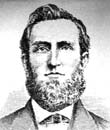
UNION VICTORY
COMMAND(S):
General Ulysses S. Grant ARMY FORCE(S):
Army of the Cumberland; Army of the Tennessee STRENGTH:
72,533 men CASUALTIES*:
5,824 men (8.0%)
* Includes killed, wounded, and missing.
General Ulysses S. Grant ARMY FORCE(S):
Army of the Cumberland; Army of the Tennessee STRENGTH:
72,533 men CASUALTIES*:
5,824 men (8.0%)
* Includes killed, wounded, and missing.
COMMAND(S):
General Braxton Bragg ARMY FORCE(S):
Army of Tennessee STRENGTH:
48,948 men CASUALTIES*:
7,000 men (14.3%)
* Includes killed, wounded, and missing.
General Braxton Bragg ARMY FORCE(S):
Army of Tennessee STRENGTH:
48,948 men CASUALTIES*:
7,000 men (14.3%)
* Includes killed, wounded, and missing.
Force Strength




Casualties Comparison




Day-by-Day Timeline of Events
April 12, 1862

June 30, 1863
The route to Chattanooga is threatened when Confederate General Bragg is forced to abandon his positions in northern Tennessee.
August 3, 1863
General Bragg's forces successfully evade Union capture when they cross the Cumberland Mountains.
September 9, 1863
General Rosecrans directs a capture of Chattanooga, Tennessee forcing Confederates to withdraw. The Confederate forces are led by General Bragg.
October 19, 1863
General Grant writes from Louisville, Kentucky "Hold Chattanooga at all hazards, I will be there as soon as possible." He would arrive in southeast Tennessee four days later.
October 21, 1863
The attack on Chattanooga is planned by Union authorities including General Grand and General Rosecrans.
November 23, 1863
The Battles for Chattanooga take place from November 23rd to NOvember 25th. Orchard Knob, Lookout Mountain, Missionary Ridge, and Rossville Gap are some of the names associated with the actions. General Grant faces General Bragg and his Army of the Tennessee.
November 25, 1863
The Chattanooga Campaign comes to a close and is recorded as a Union victory, further enhancing General Grant's growing legacy in the war.
November 26, 1863
With Confederate forces in retreat from Chattanooga, Union Generals Sherman and Hooker follow in an attempt to smash the enemy.
February 19, 1864
Like General Grant, General Sherman receives an official thanks for his services in the ongoing war - namely his direction of the Chattanooga victory.

